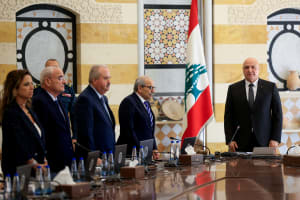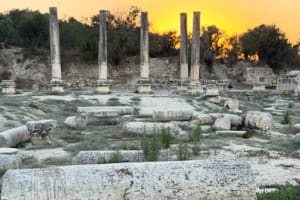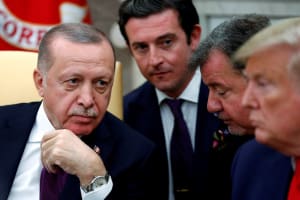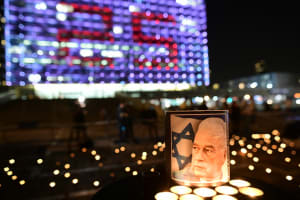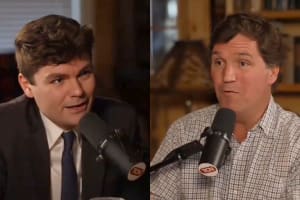Lebanese President Aoun orders army to ‘confront’ Israeli incursions after deadly IDF raid in southern Lebanon
FM Sa'ar warns Israel won't 'bury its head in the sand' as Hezbollah rearms itself

Lebanon’s president, Joseph Aoun, on Thursday instructed his military to “confront” future Israeli incursions into Lebanon, after a raid by the Israel Defense Forces in the town of Bleida left one man dead.
Aoun’s statement marks a sharp departure from his past rhetoric, as the Lebanese Armed Forces (LAF) have avoided direct confrontation with the IDF and remained on the sidelines during last year’s short military operation in southern Lebanon, leaving the Israeli army to destroy Hezbollah infrastructure.
This was also the declared goal behind the hundreds of Israeli airstrikes in Lebanon since the ceasefire began, as well as Wednesday’s raid in Bleida.
Lebanese President Joseph Aoun instructed the Lebanese Armed Forces to "confront any Israeli incursion" into southern Lebanon, following last night's killing of a municipal employee in the town of Blida by IDF ground forces. pic.twitter.com/Tc0gdY041j
— Ariel Oseran أريئل أوسيران (@ariel_oseran) October 30, 2025
The IDF said it had intended to destroy infrastructure in Bleida’s municipality building, but that troops encountered a “concrete threat” and fired to remove it.
The Lebanese state news agency (NNA) claimed the man was a municipal worker and was killed while asleep in the building.
According to the IDF, the troops only opened fire after standard arrest procedures, and said the building had been used by Hezbollah terrorists recently, adding it would continue to investigate the incident.
On Thursday, the IDF reported striking a launcher and tunnel shaft belonging to Hezbollah in the area of Mahmudiyah in southern Lebanon.
Following the incident on Wednesday, President Aoun met with LAF Commander Rudolph Haykal, requesting that he “have the Lebanese Army confront any Israeli incursion into the liberated southern territories.”
Aoun's office said the president “considered this aggression, which falls within the series of Israeli hostile practices, to have come shortly after a meeting of the monitoring committee for the ceasefire agreement (the mechanism), which is supposed not to be limited to merely recording incidents but to work to put an end to them by pressuring Israel and pushing it to commit to the provisions of the previous November agreement and to stop its violations of Lebanese sovereignty.”
The statements by Aoun, who has been known as an opponent of the terror group, were welcomed by Hezbollah, which the president has pressured to disarm.
“Hezbollah urges full support for the army with all available capabilities to enhance its defensive strength and provide it with the necessary political cover to confront this savage enemy,” Hezbollah leaders said in a statement.
The Lebanese government has tried – and so far failed – to advance a process to disarm Hezbollah and establish a state monopoly on arms. U.S. envoy Tom Barrack recently increased the pressure on Lebanon, saying its “rhetoric does not match reality.”
Lebanese media reports later stated that the military had begun strengthening its deployment and setting up new positions in southern villages, including near Bleida.
Lebanese Prime Minister Nawaf Salam joined the condemnation, accusing Israel of violating the ceasefire and adding that Lebanon would press the United Nations and international partners “to ensure an end to repeated violations and the implementation of a full Israeli withdrawal from our land.”
Israel’s Security Cabinet convened on Thursday evening to discuss the situation in Lebanon and is reportedly considering intensifying airstrikes against Hezbollah as the group works to rebuild its capabilities.
A senior Israeli official told Kan News that Hezbollah is rebuilding its offensive and defensive capabilities and is restoring its command structure. The terror group has reportedly smuggled hundreds of short-range rockets from Syria into Lebanon.
According to The Wall Street Journal, Hezbollah has been resupplying itself with rockets, antitank missiles and artillery through operational smuggling routes in Syria and via seaports, while also producing some new weapons.
After meeting UN envoy Jeanine Hennis-Plasschaert, Israeli Foreign Minister Gideon Sa’ar on Thursday stated that the terror group “continues to intensify its efforts to recover and rebuild its strength with Iran’s backing.”
“This is dangerous to Israel’s security, just as it threatens Lebanon’s future. Israel cannot bury its head in the sand in the face of this trend,” he added.

The All Israel News Staff is a team of journalists in Israel.
You might also like to read this:


